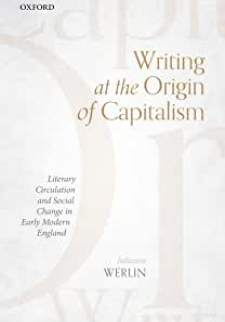Writing at the Origin of Capitalism: Literary Circulation and Social Change in Early Modern England
Julianne Werlin
2021
Oxford University Press

In the late sixteenth through seventeenth centuries, England simultaneously developed a national market and a national literary culture. Writing at the Origin of Capitalism describes how economic change in early modern England created new patterns of textual production and circulation with lasting consequences for English literature. Synthesizing research in book and media history, including investigations of manuscript and print, with Marxist historical theory, this volume demonstrates that England’s transition to capitalism had a decisive impact on techniques of writing, rates of literacy, and modes of reception, and, in turn, on the form and style of texts.
Individual chapters discuss the impact of market integration on linguistic standardization and the rise of a uniform English prose; the growth of a popular literary market alongside a national market in cheap commodities; and the decline of literary patronage with the monarchy’s loosening grip on trade regulation, among other subjects. Peddlers’ routes and price integration, monopoly licenses and bills of exchange, all prove vital for understanding early modern English writing. Each chapter reveals how books and documents were embedded in wider economic processes, and as a result, how the origin of capitalism constituted a revolutionary event in the history of English literature.
